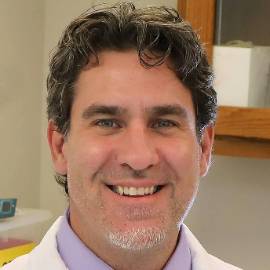
Jonathon P. Audia, PhD
Biography
Dr. Jonathon P. Audia, Professor, received his Baccalaureate and Master of Science Degrees from McMaster University in Hamilton, Ontario, Canada, and his Ph.D. in Basic Medical Sciences from the University of South Alabama College of Medicine. He currently serves as the Director of the Infectious Disease and Immunology Module for the Frederick P. Whiddon College of Medicine Medical School.
Research
Pathogen-Host Interactions, Lung Infection Biology, and Sepsis Using Pseudomonas aeruginosa and Rickettsia as Model Pathogens
The Audia Laboratory studies pathogen-host interactions using Pseudomonas aeruginosa as a model to understand lung infection biology and Rickettsia prowazekii as a model obligate intracytoplasmic pathogen.
The Role of Lung Inflammation in Sepsis:
Pseudomonas aeruginosa is a Gram-negative, opportunistic pathogen and is second on the World Health Organization Critical Priority 1 list of antibiotic resistant ESKAPE pathogens (Enterococcus faecium, Staphylococcus aureus, Klebsiella pneumoniae, Acinetobacter baumannii, P. aeruginosa, and Enterobacter species). P. aeruginosa causes more than 50,000 healthcare-associated infections annually in the United States, and is responsible for ~40% of deaths in ventilator-associated pneumonia patients. The most severe cases can progress to life-threatening conditions such as sepsis and the acute respiratory distress syndrome (ARDS) – critical illnesses for which effective therapeutics are lacking. Against this backdrop, therapeutic development is confounded by the fact that P. aeruginosa strains encode varying constellations of virulence factors resulting in heterogeneity of the host response to infection. Moreover, critically ill patients themselves are highly heterogeneous in their inflammatory response to infection, and present as a broad array of disease endotypes. Our overarching goal is to uncover causal relationships between pathogen virulence factors and host disease endotypes, and ultimately leverage these discoveries into development of novel diagnostics and therapeutics.
Towards this goal, the Audia laboratory employs a vertically integrated approach – in vitro biochemistry, molecular genetics, cell culture, isolated organ, and animal models along with human patient samples – to model pneumonia, sepsis, and ARDS. On-going projects are specifically aimed at understanding the innate immune responses of pulmonary vascular endothelial cells and macrophages to infection with emphasis on the roles of inflammasomes and caspase-1. Projects are centered on the important role of the P. aeruginosa type III secretion system and its effectors in subverting normal host responses to infection.
Transport Physiology and the Evolution of Obligate Intracellular Parasitism:
Other work in the Audia Laboratory has focused on the obligate intracellular pathogen, Rickettsia prowazekii – a category B priority pathogen and a Select Agent. Rickettsiae are transmitted by arthropods and cause human diseases such as epidemic typhus and Rocky Mountain spotted fever. As obligate intracellular pathogens, these organisms grow exclusively in the cytoplasm of the host cell, unbound by any host cell-derived membrane structures. The goal is to further scientific understanding of the mechanisms evolved by rickettsial pathogens to parasitize eukaryotic host cell cytosol as its sole growth niche and to cause disease. Imagine growing in nutrient rich cytoplasm, bathed by precursors, intermediates, and end products of cellular metabolism – as a consequence, the rickettsia has abandoned many of its own de novo biosynthetic pathways in favor of acquiring metabolites directly from the host cell cytoplasm. This work has led to discovery of novel rickettsial transport systems that allow the pathogen to parasitize nutrients available in host cell cytosol using biochemical approaches. Because these transport systems are rarely, if ever, found in free-living bacteria or the eukaryotic host cell, these systems are attractive as potential targets for therapeutic discovery.
See More

